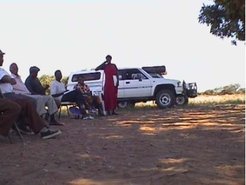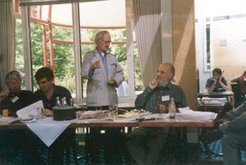Conflicting commitments in property relations
Project SummaryFor my current Max Planck project I have expanded my previous research - which has largely been carried out with Hai//om-speaking people in Namibia - to intensify field research in Australia and to pursue comparative research questions. The main objective of this project is the development of a new theoretical approach to property by taking account of conflicting commitments in property relations. So far I have conducted one period of field research each in Namibia (2000) and in Australia (2001). Preliminary results of this comparison are included in two of working papers in the MPI series (No 21, entitled "Equality, group rights, and corporate ownership of land" and No 36, entitled "Towards a theoretical approach to the moral dimension of access") and are currently compiled into a book-length manuscript which forms the written component of my "Habilitation". This book also includes comparative data from post-industrial settings in which I have become increasingly interested.

Activists from two NGOs have arrived in the northern Namibian settlement of Tsintsabis to establish a development trust fund. Both in Namibia and in Australia corporate associations are an important vehicle for local communities to receive funds and to hold communal property.
The two field trips undertaken so far were central to the initial phase of this research project in which I investigated social dilemmas, property dilemmas in particular, that is, situations in which divergent social commitments come into conflict with one another. The empirical focus has been on land rights issues. In both cases under investigation social relations are continually extended to incorporate new or changing economic and political arenas in which ownership rights have been established. At the same time individuals and corporate groups try to maintain commitments to specific places and specific people in their localised networks. In my two case studies (from Aboriginal Australia and Khoisan southern Africa) empirical examples of such dilemma situations are being documented, specifically with regard to property rights to land and its resources. The comparison of the two cases shows how dilemmas that seem to be inevitable at the level of social action are reconciled and integrated into workable social arrangements. The need to cope with conflicting commitments leads to specific virtues, directive and integrated dispositions, that govern individual strategies and social relations. In the cases at hand these are virtues of sharing property but also of sharing knowledge and experience.
Based on a background of insights gained during the first phase of the project, the current project phase investigates property dilemmas as instances of necessities being transformed into virtues. The situation of hunter-gatherers and former hunter-gatherers like Australian Aboriginal groups and southern African "San" or "Bushmen" groups has been commonly described as one of needs, in terms of the need to adapt to hostile natural and cultural environments and as producing specific practices, in terms of sharing yields and knowledge, and sharing one another's lives more generally. I am currently looking at what appear to be parallel cases which are at the same time further afield and closer to home: There is a striking similarity in the dominant view towards foragers and towards industrial workers in that both have been described as following their immediate needs, developing a taste for need, without, however, recognising that specific cultural skills and virtues are generated in the process. This research project seeks to establish empirically the interrelation between specific needs and specific virtues, and the extent to which specific virtues can be maintained as the needs that produce them either change or cease to exist. For this purpose my comparison between the two post-foraging hunter-gatherer groups will be complemented with data from two post-industrial domains, namely the Ruhrgebiet and the mitteldeutsche Industrierevier. The issues investigated are how the need to make oneself at home in the world compare, among workers in regions of heavy industry and among foragers in "remote" settings. To what extent do the workers' familiarity of large industrial machinery ("awe-inspiring" to their contemporaries) and the foragers' detailed knowledge of places ("wild" to others) produce the same virtues of making the best use of what a region can offer - different from the restless search for better opportunities elsewhere? Similarly, to what extent does the workers' dependency on extra-family ties and the foragers' tendency to flexibly draw people into their social networks produce the same kind of trust and equality - different from fixed hierarchies and descent lines? Finally, how do people in a post-industrial setting and those living in a post-foraging society compare in their attempt to maintain their virtues in a rapidly changing world?
Preliminary Results

Aidan Southall (standing) in conversation with James Woodburn at the Halle conference, June 2001.
Preliminary results of this comparative study across diverse cases suggests that access rights are often more central than ownership in the form of accumulated property, that access routes in space and time are influenced not only by forces of coercion but also by forces of attraction guiding individual agency, and that social relations based on shared access evolve in a field of tension between the creation of obligation and the creation of trust.
The comparative scope of the project is also reflected in my close co-operation with Wolde Tadesse whose project also involves research on property relations outside Eurasia. Together we have organized and convened and international symposium entitled "Property and Equality" which took place at Halle in June 2001. We are now editing the contributions to this symposium as a two volume book entitled "Property and Equality" (to be published by Berghahn Books). Volume I comprises contributions dealing with "Ritualisation, Sharing, Egalitarianism" while Volume II comprises papers on "Encapsulation, Commercialisation, Discrimination".

